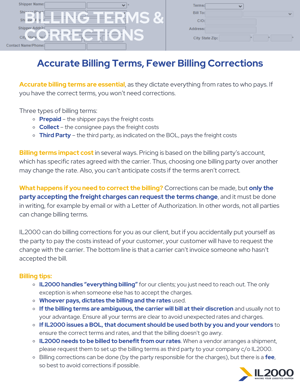As many as one in four shipment invoices in the US contain critical errors, reports Supply Chain Brain. Is that not crazy? A full 25% of nationwide shipment invoices have the potential to go significantly awry simply as a result of human error. Now, not all freight billing errors result in changes to charges, but it’s still a problem.
Sometimes the fallout of these errors is relatively minor, such as incorrect contact information, an extra digit in a tracking number, or even misworded payment terms. The result could be a slightly delayed pickup, perhaps or a few extra time-sucking phone calls to iron things out. But some billing errors can be catastrophic, with scuttled deals, steep penalty clauses for missed delivery times, or companies and their clients mired in needless damaging disputes.
Most importantly, errors that are not your fault can also become a nightmare, especially if you have to file a claim for a chargeback with a carrier. It’s a continuous game of cat and mouse with tracking your freight shipment data, and it must not be an afterthought.
It’s easy just to think of freight billing as the last flourish of paperwork to mark the passage of another successful transaction. But boosting the accuracy of your freight payments is mission-critical if you want happy customers, repeat sales, and less busy work bogging down your supply chain.
So let’s take a closer look at billing.
Here’s a quick billing overview
Let’s begin with a thirty-second Mach 2 flyover across billing territory to make sure we’re copacetic on the critical working parts:
- Who is billing us, exactly? That’ll be the carrier, AKA the transportation company handling your delivery.
- What is the carrier billing you for? The simple answer, of course, is that the carrier is issuing an invoice for the material they’re shipping.
- How is the cost of that bill determined? Here’s where it gets interesting. The billing party (the company that’s paying, essentially) will agree to a rate. That rate, combined with the weight of the shipment, its size, the distance it’s going, the speed it needs to get there and handling conditions will all factor into billing cost. Billing is much more than an extra flourish; it’s an engine in itself and has many moving parts.
- Who’ll pay? That depends on the billing and payment terms for the transaction. If it’s prepaid, the shipper pays the freight costs. If it’s collect, the consignee is responsible for payment. If it’s third party, neither the shipper nor the consignee pays. Typically, a separate agent (often though not always a 3PL) will pay up on behalf of the shipper or consignee. Remember that last one. We’ll come back to that.
The fundamental parameters of billing are quite basic, but even at this 101 level, all the trickiest complications of freight billing are peeking out from behind the bullet points. Let’s rootle them out, shall we?
- The amount charged for a shipment is calculated from multiple variables. Get that data wrong, and the billing process gets waylaid.
- Also, note that rates aren’t set in stone. The party who pays factors deeply into shipment cost.
- And finally, stick a pin in the fact that who pays and how much is very much a movable beast. The potential for misunderstanding? High.
Congratulations, if you weren’t before, you’re now officially up to speed on billing 101. Now might be a good time to grab a cookie.
But let’s get one more thing abundantly clear. Billing means that somewhere, someone had to enter something manually. That risk for human error is omnipresent, and it could affect anything listed above.
Here’s what you need to know about billing errors
Errors happen. What then? There are three main things you should know if you or your team encounters, commits, or stumbles across a billing error.

1. Know what you can change and what you can’t
A bill of lading goes out, and you discover it’s set to the wrong terms. It may not be too late. Changes can be made. For example, you might revise the delivery location, the timeframe for delivery, or handling requirements.
However, bear in mind that these changes can only be put into effect if the party accepting the freight charges initiates and approves the change request. Moreover, that request must be submitted in writing, for example via an email or a letter of authorization. A quick phone call will usually not cut it.
This may be a trivial thing to fix with your client — a simple matter of picking up the phone and asking the paying party to action an amendment request. But just as easily, a situation like this can cause a disagreement. And at the end of the day, if the paying party doesn’t agree to amend the billing terms, there’s not much you can do about it. It’s crucial to understand that not all parties can change the billing terms. You have a window of opportunity to fix a problem but only if the paying party agrees.
Trying to negotiate this complex terrain for international shipments? The terms used in one language could be completely different from another. Why? Because cultures are different, and there is a whole set of terms, called Incoterms, that help guide international transactions. Here our resident Incoterms guru talks about how to avoid the six most common international shipping pitfalls and what they imply for logistics managers.
2. Understand the impact of ambiguity
Perhaps the error you encountered isn’t quite so black and white as mistaken terms. You may find yourself in more of an ambiguous gray zone. Perhaps you interpreted dimension parameters one way, and your carrier interpreted them in another. Or it could be that the delivery location left room for misunderstanding.
The one near certainty in all this is that all things being equal, the carrier will bill at their discretion and to their advantage. That makes sense. They’re running a business, so if they have wiggle room, they’ll naturally take it. The trick is not to offer that wriggle room.
How do you do that? Relentless clarity is the only answer. Clear documentation, direct communication, and all procedural requirements were scrupulously observed. A good supply chain consultant and partner can help you here because they’ll have an encyclopedic understanding of best practice principles, right down to a carrier’s expectation by freight, weight, and transportation lane.
Of course, that’s only a fraction of our value, but getting the most from carrier relationships and improving carrier compliance with your billing needs is indeed possible. Interested in digging deeper into carrier compliance?
3. Errors are also opportunities
Finally, sometimes you just have to accept the loss associated with a suboptimal shipping request and move on. But be sure that moving onward is also moving upward.
It’s critical to review what happened with a billing error so that you can avoid it happening in the future. This can be a stressful learning curve if you are going it alone. However, with a partner like IL2000 on your side, this learning process is facilitated via an ongoing process of freight auditing.
The beauty of freight auditing is that this systematizes the process of organizational learning. When an unexpected billing outcome happens you won’t just find it by chance. The problem will find its way to a dashboard and an expert will find their way to a solution, arguing on your behalf if necessary to realize an optimally priced solution. As important as money saved per transaction, at the end of this process, your company gains a blueprint to avoid the error happening again. Auditing closes the circle and opens the door to freight optimization opportunities in the future. After all, the insight from auditing naturally possesses qualities that will help you understand your most valuable clients, suppliers, vendors and beyond. It’s what you use that data for that matters most.
IL2000 specializes in using freight auditing as a tool for finding billing errors, resolving them, and working with you to eliminate the problem in future billing cycles, while also ensuring you're actually paying for used capacity, not empty space and wasted resources.
Here’s how IL2000 can help with freight billing
We’ve established that freight billing is important, deceptively complex, and particularly prone to errors both small and large. Let’s look at how a logistics-as-a-service (LaaS) partner can radically alter the equation.
Get rid of busy work with billing managed for you
A good partner will manage freight billing on your behalf. A great partner will proactively manage your billing, saving you time and frustration, sure, but also eliminating unnecessary administrative friction between you, your clients, and the carriers you use.
Pay less on freight
As outlined in the quick overview, you can ship with a carrier using third-party billing terms. Here’s why that’s so important. By having your vendors bill directly to IL2000, you may gain access to more competitive carrier shipment rates. Remember, we have established relationships and operate at scale with these carriers.
Protect your interests while keeping your customers happy

In freight billing, it’s so easy to inadvertently introduce a point of contention that’ll become a big issue later on. Our experts have years of experience in brokering clean, clear, shipping terms with no room for confusion or contention. Clarity surrounding billing terms is the easiest way to avoid disputes, keep your customers happy, and manage your freight operation confidently and accurately.
Keep billing errors from disrupting your supply chain with IL2000
We can fix that for you!
Billing is time-consuming and riddled with the potential for error. Moreover, it’s expensive! IL2000 can radically boost the accuracy of your freight payments with:
- Expert management of your whole billing cycle with over 50 data points routinely checked on each invoice.
- Instant online access to all the shipment documentation and reporting tools you need to run a smooth freight operation.
- Access to our dedicated freight desk experts who will help you resolve errors, handle disputes on your behalf, and help you plan to eliminate future billing errors.
- Improved carrier rates and better carrier relationships.
The first step to resolving your freight billing problems is easy. All you need to do is drop your details here. We’ll be in touch to schedule a no-obligation discovery call and supply chain analysis.


